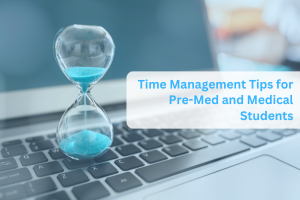You feel your heart quicken and a cold sweat rush through your body as you glance at the heading of the email pop-up on your smart device. “University of ____ MD Program Interview Invitation…..”. A wave of emotions and thoughts race through your mind – do I tell my mom or my dad first? Did they send the email to the wrong person? (no) Holy, the interview is in a couple weeks/months, how do I prepare?!
Interview season is right around the corner, which is an undeniably nerve-wracking time for many medical school applicants. After acing your academics, passing the MCATs, balancing numerous extracurricular/research/volunteering activities, and saying no to friends to study on a Friday night, you’ve finally reached the last obstacle of the pre-medical marathon. Having dedicated so much, it is crucial to give the interview your best shot, and these five tips will help with preparing for any medical school interview.
1. Know the School and the Interview Style
First and foremost, know what type of interview you will be attending. Is it an MPI? An MMI? A Panel? A combination of two? Knowing the type of interview will be essential for tailoring your preparation accordingly. For example, in MMIs you will be provided with 1-2 minutes to read a prompt before entering the interview while in a panel or one-on-one interviews, you will be given a question on the spot to answer. In some interviews, the interviewer may know your application and scores, while others may simply know your name. There are tons of resources online regarding the basics of each interview style and some medical schools may have their own basic interview guide on their websites as well – be sure to use them!
In addition, remember to do some background research on the school you are interviewing too. Know their mission statement, values, research strengths, academic curriculum.etc This can help with showing interviewers why you’re a good fit for their program and also developing questions to ask on interview day. Apart from visiting the school website, one of the best ways to learn more about a school is to talk to the medical students who attend there.
2. Know Yourself
Medical schools want to know who you are and if you are really the person you expressed yourself to be on your application. Therefore, spend some time to self-reflect and self-evaluate. Know your strengths, weaknesses, and make a list of life experiences that made you into the person you are today. Be able to discuss in-depth your academic background, extracurricular and volunteer activities, employment and research experience, and also views on medical problems and relevant ethical issues. Be able to talk about lessons learned with each of your different life experiences and why they are important. Prepare responses to high yield-questions such as “tell me about yourself” and “why are you pursuing medicine?”. These “simple” questions are arguably the toughest, so really dedicate time to making sure you have a good response.
3. Practice Smart
“Practice does not make perfect. Only perfect practice makes perfect” – Vince Lombardi. Reaching “perfection” in interviewing skills is arguably impossible, but you can certainly become very good at it with the right practice. The only way to get better at interviews is to practice them (obviously). There are plenty of mock interview questions for the various interview styles online. Use these resources and practice saying your responses out loud under timed conditions. Ask friends, family, medical students, doctors – anyone who you can trust to help you do a mock interview. Try to fully simulate the interview environment – knock on the door before entering, introduce yourself to the interviewer, shake the interviewer’s hand.etc As the days come closer to the actual interview, try practicing with your interview attire on. Request feedback from the mock interviewer on not only the content of your answer, but your voice tone, pace, facial expression, eye contact, and ability to communicate. I cannot emphasize enough how crucial feedback is in improving your interview skills. Write down the feedback, and be sure to implement the tips for your next practice.
In addition, be familiar with current global and ethical issues, and be prepared to respond to controversial topics. Keep up to date with the news and read about current healthcare and medical issues, new research and technologies, bioethics, and scientific thinking. Have a notebook ready to jot down important points you want to remember, and regularly review these points. As you accumulate your knowledge, you will become more confident in answering ethical and knowledge-based interview questions.
Extra tip: Videotape yourself doing a full interview, or practice speaking in front of a mirror. You will notice many aspects of your interview which you may want to fix or change. For example, you may notice yourself not making enough eye contact or you may use too many hand gestures.
4. Be honest
This goes without saying, but NEVER lie in an interview. This is an instant red flag and if the interviewers catch it (most of the time they will), your chance of admission is probably close to zero. Medical school interviewers have plenty of experience at getting the truth – it simply isn’t worth lying. It is much safer telling the truth; after all, integrity and honesty are crucial within medicine.
5. Coffee Chat
This is my golden tip. Treat the interview like a coffee chat with your best friend; this will really help with the nerves and anxiousness. Smile, stay calm, be engaging, confident, and speak at a conversational pace. Set the interview off with a good first impression; dress professionally, be well groomed, and offer a firm handshake with a short introduction. Be mindful of your body language (don’t cross your arms) and be humble and enthusiastic – show why you’re excited and passionate about pursuing this profession! Don’t forget to thank the interviewer at the end.


